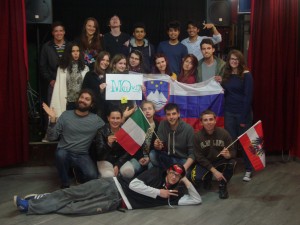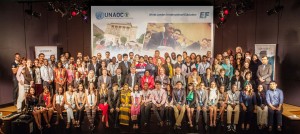One hundred years ago, on the 23 May 1915, as the tragedy of the First World War showed no sign of abating, Italy joined the destructive conflict ostensibly to secure strategic territory around the Eastern Adriatic. A century later, in Postojna, an Erasmus+ youth project featuring comedy improvisation brought together young people from many of the formerly antagonistic countries.
Postojna was a symbolic location for this project. Lying above Trieste, near where the Alpine barrier fades- the crest line of Postojna is where the plains of Mitteleuropa come closest to the Mediterranean. According to the historian Rusinow this makes ´the Postojna doorway´ the ‘shortest and lowest transit route to the European interior in the whole 1300 mile stretch of mountains between the Bosporus and the Rhone Valley break’. For this reason, the area was historically the junction of Europe’s three largest people, Italian, German and Slav, all with historic claims to the region. Geopolitically strategic, having been the headquarters for the Austro-Hungarian Field Marshall Svetozar Borojevic during the Great War. The borderland town would change hands several times between Austrian, Italy, Yugoslavia and Slovenia during the 20th century.
Today, thanks to regional co-operation programs such as the European Strategy for the Danube region (EUSDR), geography rather than history gives the answers to reconciliation. Choosing to look forward, live in the present rather than the past, a transnational initiative involving Slovene, Italian, Croatian and Austrian youth got together through an Erasmus + Project in a town that still bears names in three different languages (Postojna/ Postumina/ Adelsberg).
The youth exchange was a product of the EUSDR seminar on social cohesion that took place in Vienna in December 2014. The project was inspired by the reconciliation ritual in Trieste in 2010 where a regional partnership between leaders in Zagreb, Ljubljana and Rome helped sponsor a concert of young classical musicians from Italy, Croatia and Slovenia. At a recent lecture in Vienna´s Hofburg, the former Croatia president Josipovic described the initiative as ´the highlight of my premiership´. The young musicians rehearsed and played together a concert to mark the 90 anniversary of the arson of the Slovene cultural centre in Trieste in 1920. Like in Trieste in 2010, the 2015 project hosted by the Postojna youth centre, brought together youth people through different activities, excursions and comedy improvisation theatre.

The theatre workshops were envisaged, organised and run by SPIKU, a youth comedy improvisation troupe from Vienna. Having been founded as a social entrepreneurship to help connect migrants in Austria to native born Austrian, SPIKU´s (Spiel mit den Kulturen-playing with cultures) motley troupe consists of actors and students, refugees and teachers as well historians and youth workers. SPIKU performs annual comedy improvisation performances at the TAG theatre in Vienna but its equally essential component is its socially engaged workshops with young people from different cultures, building bridges in the process.The project started its international career at the EU sponsored seminar in Brussels in 2013 and last year was the Austrian representative at the United Nations Alliance of Civilizations in New York. The author, an Austro-British-Croatian, held a comedy improvisation workshop consisting of young people from all parts of the world.

In December 2014, at the showcase part of the EUSDR seminar in Vienna, SPIKU led an improvisation theatre workshop for participants from the Danube region. The challenge was to bring the sensitive neighborhood of Bosnians and Croatians, Serbs and Kosovans, Hungarians and Romanians together. Due to comedy improvisation´s inherently communicative nature, the focus on the moment and spontaneity, former antagonists were able to laugh and cry (with laughter) on stage. Links established between SPIKU and the Slovene regional NGO support hub Boreo started a project that connected youth from the Alps to the Adriatic.
Through theatre, the SPIKU workshop leaders, led by the talented, passionate and energetic actress Paula Kuhn organised humorous sketches, theatre games and playful sketches that helped young people work together, laught at themselves and ultimately help understand each other better. The aim of SPIKU international was to show young people that they can be better actors, in greater performances on a bigger stage than their parents. SPIKU´s next project involves a longer partnership between young people living in the borderlands regions of Europe like Carinthia, the Julian March and Istria. The pilot projet in Postojna showed that banteriffic bridge building through comedy drama, jokes and humour is a splendid way to build links between youth today. Let the laughter continue!